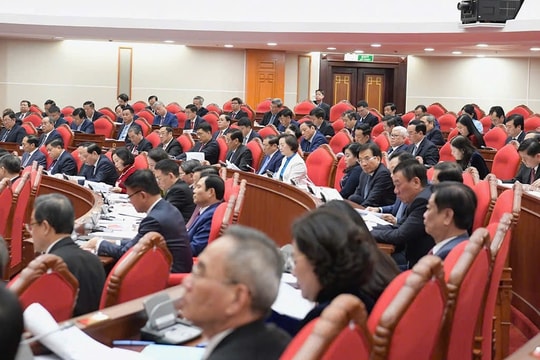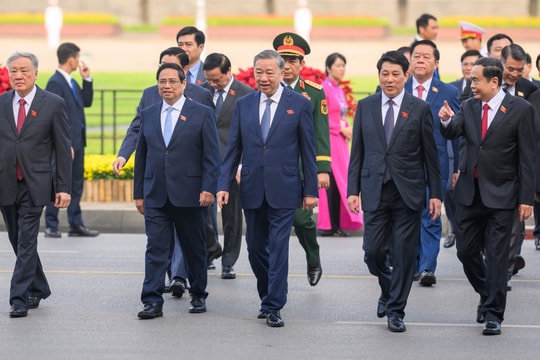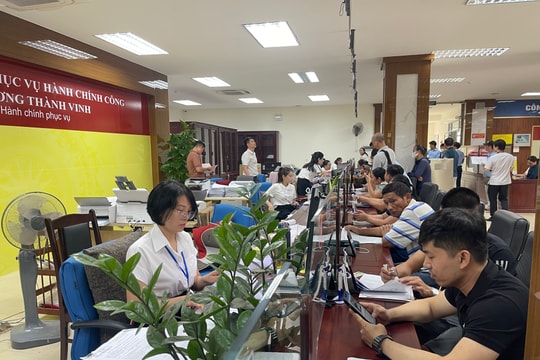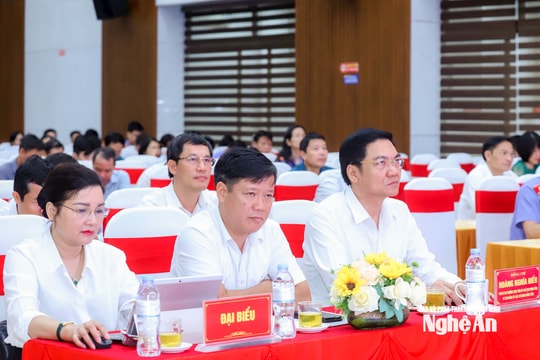Non-local Secretary: Avoid isolation
There needs to be a mechanism for non-local Secretaries to avoid being surrounded and isolated by local cadres and interest groups competing to take advantage.
The policy of having provincial and district Party Secretaries not be local people received consensus and support at the 7th Central Conference of the 12th tenure. This policy is considered a breakthrough in personnel work, helping this work to be more objective, reducing bias and power abuse.
Sharing his views on this policy, National Assembly delegate Luu Binh Nhuong, Standing Member of the National Assembly's Committee on Social Affairs, said that he also supports it because it is a correct policy, but it is necessary to summarize its effectiveness and what difficulties and problems it has encountered in its implementation, whether it should be continued or abandoned, or if there are solutions to continue affirming the correctness and necessity of the policy in practice, even if it needs to be institutionalized into legal regulations.
|
| National Assembly Deputy, Standing Member of the National Assembly's Committee on Social Affairs Luu Binh Nhuong (Photo: Binh Can) |
PV:Do you think that implementing the policy of having provincial and district secretaries not be local people can limit the practice of buying and selling positions and power?
National Assembly Delegate Luu Binh Nhuong: In my opinion, this policy only contributes but does not completely solve the problem of buying and selling positions and power.
In fact, in my opinion, we have only considered the basis of evaluating cadres and assigning cadres to be Secretaries of some localities according to the rotation method at the same time to resolve some difficulties in the leadership and direction of Party work in some localities where there is disunity or there are problems in leadership and cadre work in that locality.
The recent appointment of a number of officials as Party Secretaries of several provinces also aims to help the rotated officials have the conditions to develop and at the same time access local activities to ensure they meet the standards for Central development.
All the things we have done in the past, in my opinion, have not been aimed at the current Project's objectives. Therefore, in some aspects, it can be said that we have not yet concluded whether the mobilization or arrangement of a cadre who is not from that locality to be the Party Secretary can ensure the solution to the problem of limiting or preventing the practice of power and position abuse, and limiting the situation of making cadre work become an objective issue or not.
Prevent local officials from forming cliques to surround and isolate
PV:So, in your opinion, we need to pilot this policy for a certain period of time, then summarize it?
National Assembly Delegate Luu Binh Nhuong:In some aspects, I agree with the Central Committee's inclusion in this Conference to discuss and consider this policy. However, in my opinion, it will take about 2-3 years, even 5 years, to have a summary of this policy. We should not rush to consider this and should not affirm that it will prevent the situation of buying and selling positions and power. This is a correct policy, but how effective it is still needs to be summarized. Our Party is always very cautious with any policy, even if it is a correct policy, it still needs to have a preliminary and final summary to see how effective it is and what difficulties and problems there are in its implementation, whether it should be continued or abandoned, or have solutions to continue to affirm the correctness and necessity of that policy in practice, even if it needs to be institutionalized into legal regulations.
We have had policies that were correct but still had to stop, such as the policy of researching to change the Procuracy to the Public Prosecution Office; or researching to change the enforcement agency to the Ministry of Justice. Maybe these policies will be implemented at another time.
I really hope that with this policy, the Central Government will set out a roadmap for implementation. Being a Provincial Party Secretary is not an easy task, requiring cadres to not only have a broad understanding of the locality, culture, people, and socio-economic conditions, but also have the courage to lead and lead a locality effectively. This is an issue that needs to be carefully considered and cannot be done in a general way. I support this policy but need to be cautious because it is not only related to the cadres who are sent to the locality but also related to the socio-economic development, cadre work, psychology, ideology, and politics of the cadres and people in the receiving locality.
In my opinion, there needs to be specific guidelines for implementation, with a clear process, ensuring that cadres arriving in the locality are convenient, creating consensus among both the arrivals and local cadres and people. At the same time, there must also be a mechanism for cadres to have favorable conditions to approach and learn deeply, in order to make correct and accurate decisions; avoid the phenomenon of "wet feet", not understanding deeply but giving instructions; or the situation of being surrounded and isolated by local cadres, interest groups competing to take advantage, in meetings, there is superficial agreement but not in the heart, the Secretary is invisibly turned into an "oasis", and the direction and leadership work is ineffective.
Besides, it is also necessary to prepare to withdraw those cadres under certain conditions, ensuring that no cadres are lost and that the implementation of this policy is not affected.
PV:Do you have any suggestions for selecting the Secretary, or should we keep the old way of the Secretariat and Politburo arranging and assigning?
National Assembly Delegate Luu Binh Nhuong: I support the preliminary selection method and the establishment of a preliminary selection council. Previously, we needed at least 2 candidates to appoint a position, but with this policy, we need at least 3 candidates to select 1, if you do not work in this locality, you can work in another locality. The preliminary selection council must be directly directed and decided upon by the Secretariat and Politburo, including members of the Politburo, Secretariat, members of party committees, the Government, including the National Assembly and some members of local Party committees, authorities and fronts for consideration.
Doing so will create consensus from the beginning. We should consider changing the old way of doing things, only considering a specific person and then bringing them in. Instead of recruiting civil servants like we do now, we conduct a preliminary selection at the Central level and report to the Central level. We can pilot this form and learn from experience during the implementation process.
|
The type of diploma obtained by people in the guise of strategic cadres
PV:You once said that the process of appointing officials is usually not wrong, but the error lies in the input stage, the stage of selecting people. In your opinion, what factors should be considered when selecting strategic personnel?
National Assembly Delegate Luu Binh Nhuong: This project focuses on the strategic leadership team. Public opinion expects that those selected to be strategic-level candidates must be truly "both red and expert" according to Uncle Ho's viewpoint, not those who have gone through many times of lobbying, or as journalist Nhi Le said, tried every way to "sneak in".
There are cases where the Secretariat and the Politburo evaluate based on the records of the cadres and may not have had the opportunity to approach, directly assign work, or test the candidates. So we must let the grassroots and especially the people evaluate whether those candidates really meet the requirements of strategic cadres or not, or are just people who create the cover of strategic cadres, but in reality have no qualities, but only "jump on the shoulders" and "sneak under the shirts" of others to be promoted.
Our Party is the Party of the nation, so Party cadres need to have official evaluations from the people, from Party cadres and members, and from those who have led and been led and managed by these cadres. It must even be considered widely, and there must be a mechanism similar to the way of collecting opinions from People's Council and National Assembly delegates, and at the same time, those evaluations must be made public; avoiding the phenomenon of assigning only a few representatives to evaluate.
Selecting key cadres for the Central Executive Committee is not easy, so it cannot be done arbitrarily in each place. That requirement requires the Central Committee to have guidance, and must assign the Central Organizing Committee to guide the unification of the mechanism to get the people's opinions; the Central Propaganda Department must also be an active agency in implementing political and ideological work.
The key issue in the mechanism for selecting and evaluating a qualified cadre is to have standards to base the evaluation on: First, it must be quality, it must be clearly defined what factors the quality includes, including spirit, attitude, and training process... Second, it is the standard of capacity, must have qualifications appropriate to the field they work in, not to let the phenomenon of people saying "it seems that being a member of the Central Committee can be assigned any task, can be the Minister of any Ministry, can be the Secretary of any province" become true. A very important factor, in my opinion, is understanding of the law, leaders who do not understand the law cannot lead those who are enforcing the law.
In addition to the specific standards, in my opinion, it is important to note that if that cadre has been involved in even minor violations related to violations of the law, ethics, or corruption, it must be immediately eliminated to avoid the situation of just letting them in and then later being reprimanded and that is it. We have let some cadres like that slip through the net, and the people are not convinced or recognized, such cadres lack integrity.
We must study and develop a method to organize the assessment to collect opinions from the people and organizations, and most importantly, it must be public, avoid hiding information, do not use too many "confidential" concepts, as a leader of the people, the method must be public so that the people know, can contribute opinions, and at the same time publicize the assessment results for comparison. In my opinion, these are "hard" factors for the Politburo and the Secretariat to consider an official to avoid the situation of an official not completing his/her tasks or violating the law or having the potential to violate the law.
PV:Thank you, sir./.

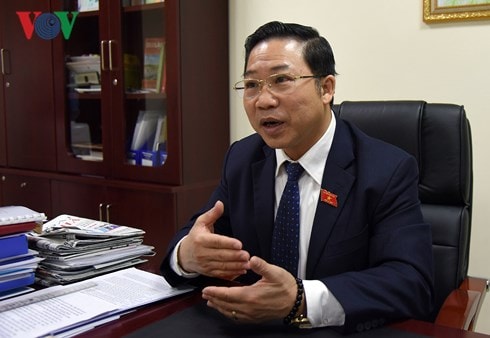
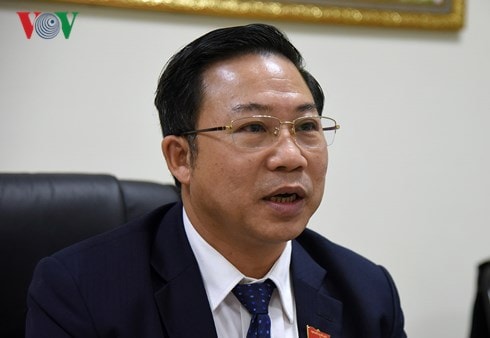
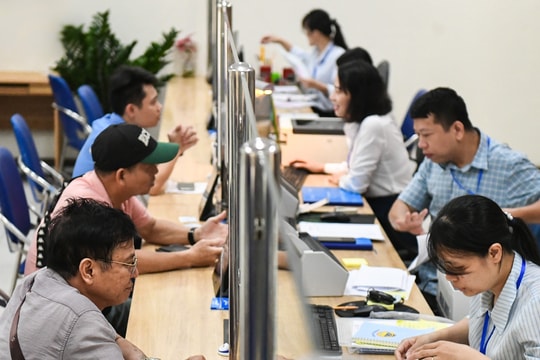
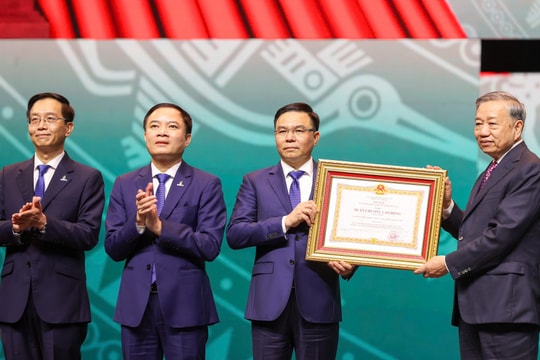
.jpg)
